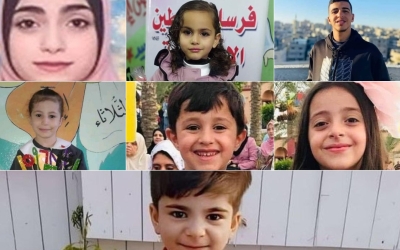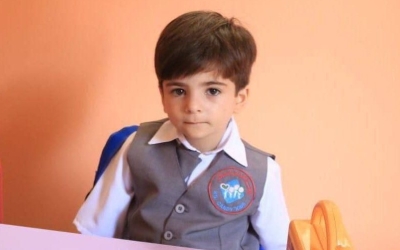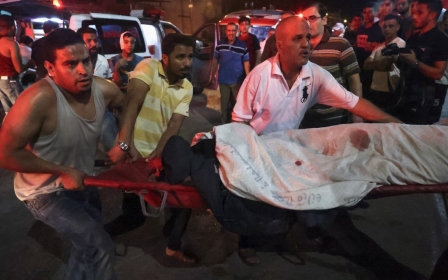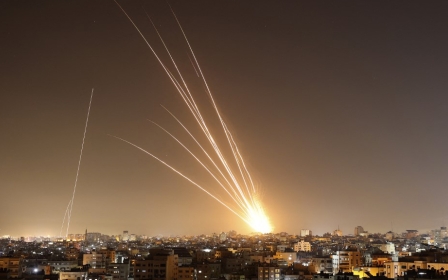Gaza: Palestinians keep children, essentials close as Israel's bombing rages
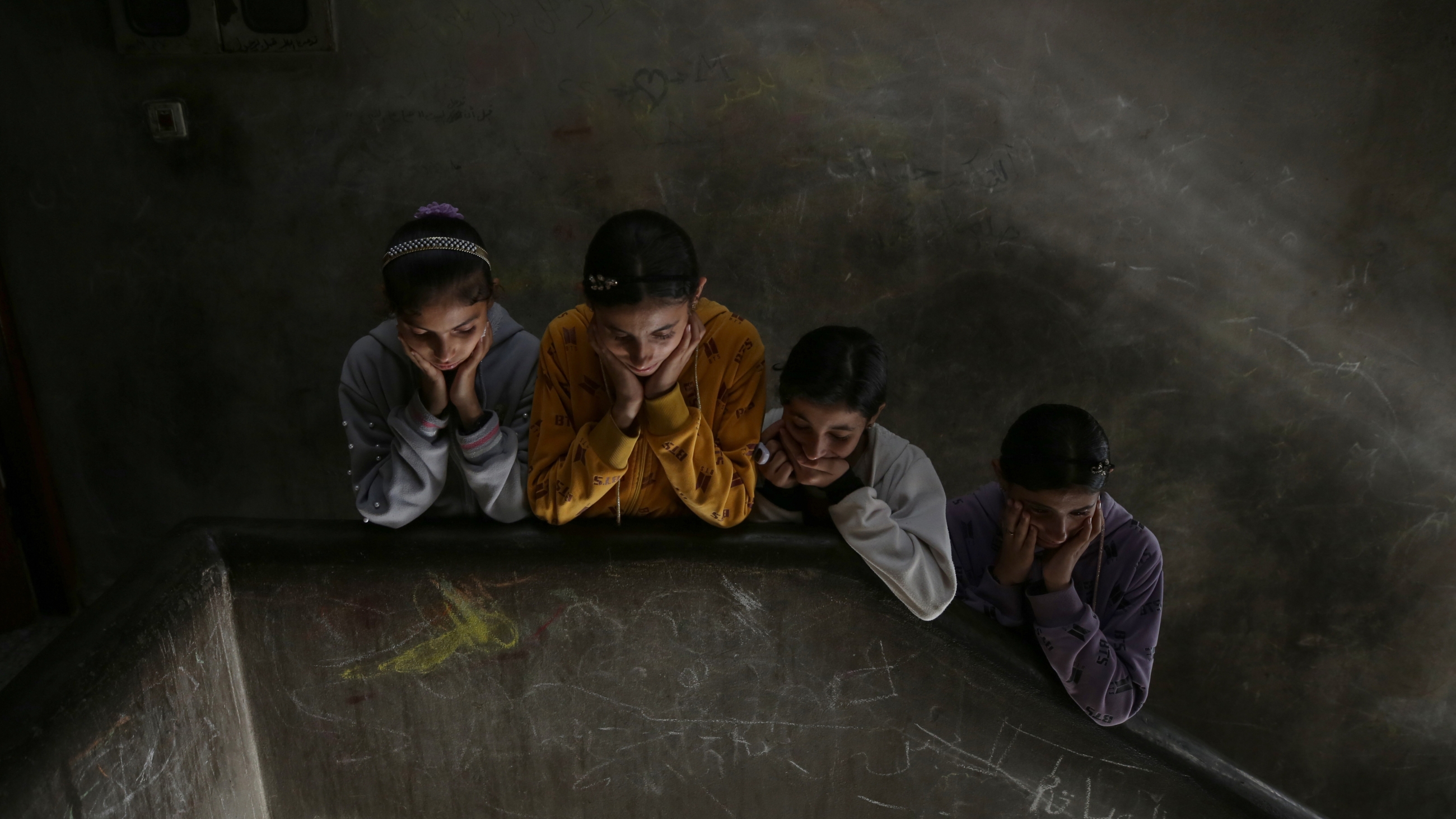
For the last three days, Noura Waheidi has kept her three children close.
With Israeli warplanes soaring above the besieged Gaza Strip every night and launching devastating air strikes on densely populated sites it claims are affiliated with Palestinian resistance factions, she, like every other Palestinian, has been on edge.
At least 31 Palestinians have been killed - including five children - since Israel began targeting so-called military sites in the enclave.
While Israel says its attacks are "very precise" and meant to only target members of armed factions, the percentage of civilians killed remains high.
As fear grows with each attack, residents have developed habits or practices to reduce physical and psychological harm.
New MEE newsletter: Jerusalem Dispatch
Sign up to get the latest insights and analysis on Israel-Palestine, alongside Turkey Unpacked and other MEE newsletters
Aware that they or their neighbours could be targeted at any moment, Palestinians usually keep their precious belongings and official documents in one place, so that they can grab them quickly in the event of an evacuation.
"We put everything in one bag that I call the emergency bag. We keep all our official papers and belongings in it, including our IDs, birth certificates, contracts, gold, and money," Waheidi told Middle East Eye.
“We expect to evacuate our home at any moment, there is no place safe in Gaza and we cannot just expect that we would not be targeted just because we are all civilians in the building or neighbourhood. So we need to be prepared, that if we have to leave, we have our most important belongings with us.”
'We put everything in one bag that I call the emergency bag'
- Noura Waheidi, Gaza resident
Others chose to keep their documents and valuables in other safe places when they feel their neighbourhoods are under threat.
Hala Saqqa*, 31, who is married and lives away from her parents, keeps her gold and official documents at her parents' home, even during more peaceful times.
"My neighbourhood was targeted multiple times during previous offensives. A nearby residential tower was bombed in 2021, so I feel threatened all the time that our building or other adjacent ones would be bombed at any moment," the housewife said.
"I have a constant fear that something would happen at any moment and that I would not even have the time to take the important documents."
'If we die, we die together'
When Israeli air strikes became a common occurrence following the transfer of powers from Israeli to Palestinian control of the Gaza Strip in 1994, the Palestinians learned that keeping doors and windows open during air strikes helps ease air pressure and reduces the chance of glass shattering.
Dina Basel, 33, told MEE that even though they first experienced air raids as children in the 1990s, similar strikes also took place after the Israeli occupation of Palestine in 1967, and her grandmother passed on some wisdom.
"Whenever an attack started, she used to tell us: ‘Turn off the lights and open the windows and doors.’ They thought that keeping buildings and neighborhoods dark would make it harder for the warplanes to target them.
"This might not be the case now with the very sophisticated weapons the occupation has, but we still do it sometimes."
Basel said that she tends to keep her apartment door unlocked to make it easier to flee if the building was targeted.
"Although no one would feel safe keeping their door unlocked, we have to keep it this way during offensives, mainly to be able to flee faster and easier, but also to make it easier for rescue crews to enter our home if we ever get bombed," she added.
"It is a must even during the coldest nights," Basel said.
In a bid to avoid the painful loss of family members, families in Gaza tend to confine themselves to one room during strikes.
"When there is bombing, we gather in one room so that if we are lucky enough to stay alive, we live together, and if we die, we die together and no one feels the grief of loss."
"It is a culture," Basel added.
Eman Basher, an English teacher at a United Nations Relief and Works Agency school in Gaza, echoes that sentiment.
"The first thing that I ever do is what every family in Gaza does, no matter their backgrounds and locations; we find a safe room and we all gather in it," she told MEE.
"The gathering [of family] helps alleviate the stress, and of course [we have] the common idea that if we die, we die together."
Wearing modest clothes to bed
Fearing death or the need to suddenly flee at any moment, many women in Gaza tend to sleep in the 'prayer dress' which has become a common ‘outfit of war’ as it covers both the head and body. If they don’t wear it to bed, it’s kept within reach.
“When I feel that the bombing is approaching, I rush to wear the prayer dress in preparation for evacuating. I try to wear it most of the day because no one knows when they are going to be targeted,” Nadia Said*, an employee at a civil society organisation, said.
“When I try to sleep while the situation is getting tense, I sleep with the dress on, even if it is too hot,” she continued.
"I do not want to die or leave home wearing shorts."
Eman Basher says that her habits during strikes have completely changed since motherhood.
“The bag that I used to prepare is now bigger, it includes the kids’ certificates, diapers and milk for Rita, and clothes,” the mother of three said.
But Basher says the hardest job is to find answers to her children’s persistent questions.
“'It’s fireworks,' [I say] and they do not always believe me. ‘Ok, but celebrating what?, they ask. 'Why don’t [the fireworks] have many colours? Why won’t you allow us to watch them from the window?'"
“You have to find suitable lies if reality betrays you,” she continued.
When schools shut down, Basher has to get creative.
'You have to find suitable lies if reality betrays you'
- Mother in Gaza
“The teacher sent me [a message] saying that you get some days off because she is sick, or ‘I allowed you to stay home so that we can have some time together’ [I tell them]. Sometimes I feel that they already know [what is going on] but they let me [lie].”
Dina Basel has found other ways to keep her children distracted during tense situations.
“We celebrate the bombing,” she says.
"Whenever we hear a loud explosion, we start cheering and clapping, as if it is a pleasant thing. We do not want to seem scared or worried so they feel threatened and anxious. So, we turn the situation into its opposite.
"If we have to follow the news on television, I give them the mobiles so that they get distracted by kids’ videos and do not give their attention to what is said or shown."
War groceries
When the Israeli authorities declare the beginning of a military operation on the blockaded enclave, residents rush to nearby supermarkets and bakeries to buy what Palestinians call "war groceries".
This includes basic food staples like bread, canned food, rice, macaroni, and legumes. If bakeries shut down, families bake their own bread, so they make sure to store large amounts of the ingredients necessary.
Those with children have to secure other kinds of products, including diapers, milk, and drugs.
"Antipyretics and cough suppressants are on the top of my list. Of course, parents with children who suffer chronic diseases have to secure their medications for the next weeks or months," Ahmed Salim, a father of two daughters, told MEE.
Salim's seven-year-old daughter suffers from diabetes and requires specific medication not available in all pharmacies.
The resident of West Gaza said that when the latest attacks started on Tuesday, he had to travel all the way to central Gaza to secure insulin pens.
Salim says that the worry about securing food and medicine for his family rivals the fear of being bombed.
“I keep thinking: what if our food runs out and the markets are closed? Or if I cannot secure my daughter’s life-saving medicine. The responsibility is big and it gets bigger during attacks.”
If Palestinians have to stay home, they try to find ways to alleviate the stress and create a new routine, especially if they are used to spending most of their day outside.
Nadia Said* buys large amounts of chips and crackers and watches TV series to distract herself from the sound of bombing.
"I find me a new series online and try to get busy watching it all day. I put my earphones on and isolate myself from reality," she told MEE.
"I cannot keep following the news and watching heartbreaking photos and videos on social media all day, or keep hearing the bombing everywhere in Gaza."
"We have to find a way or else we would die of stress."
Middle East Eye delivers independent and unrivalled coverage and analysis of the Middle East, North Africa and beyond. To learn more about republishing this content and the associated fees, please fill out this form. More about MEE can be found here.


